七年级一般过去时的知识点
一般过去式知识点

一般过去式及练习一、基本概念一般过去时(simple past tense)表示过去某个时间里发生的动作或状态;过去习惯性、经常性的动作、行为;过去主语所具备的能力和性格。
二、基本结构主语+动词过去式+其他否定形式①was/were+not;②在行为动词前加didn't,同时还原行为动词主语+do+其他?例句She often came to help us in those days. Ididn't know you were so busy.一般过去式的构成形式肯定式疑问式否定式疑问否定式I worked Did I work? I did not work Did I not work?He(she,it) worked Did he(she,it)work?He (she,it)didnot workDid he(she,it)notwork?We worked Did we work? We did not work Did we not work?You worked Did you work? You did not work Did you not work?They worked Did they work? They did not work Did they not work?三、一般过去时的用法(1)一般过去时表示在过去某个特定时间发生,也可以表示过去习惯性、经常性的动作。
一般过去时不强调动作对现在的影响,只说明过去的事情。
句式:主语+过去动词+宾语+其他如:I had a word with Julia this morning.今天早晨,我跟朱丽亚说了几句话。
He smoked many cigarettes a day until he gave up. 他没有戒烟的那阵子,抽烟抽得可凶了。
(2)一般过去时常与表示过去的时间状语或从句连用,如:yesterday, last week, in 1993, at that time, once, during the war, before, a few days ago, when 等等。
初一英语英语一般过去时知识点总结含解析

初一英语英语一般过去时知识点总结含解析一、初中英语一般过去时1.John and I ________ to visit his grandparents last Sunday afternoon.A. goB. wentC. will goD. have gone【答案】 B【解析】【分析】考查动词时态。
根据last Sunday知道用一般过去时,故选B。
2.He almost fell down. But he _____.A. didn'tB. doesn'tC. won't【答案】 A【解析】【分析】句意:他几乎摔倒,但是他没有。
前句动词fell是fall的过去式,说明句子用的一般过去时态,后句也还是对那件事的描述,还是用一般过去时态,否定:动词前面加didn't,同时把动词变为原形。
故选A。
3.A bridge ________over the river last year.A. buildsB. builtC. was builtD. is built【答案】 C【解析】【分析】句意:去年河上建了一座桥。
主语是谓语的执行者时,用主动语态,主语是谓语的承受者时,用被动语态。
a bridge是谓语build的承受者,用被动语态;表示在last year发生的过去动作,用一般过去时态,故选C。
4.As we all know, the Silk Road _______ China to the west in ancient times.A. connectsB. connectedC. will connectD. is connecting【答案】B【解析】【分析】句意:众所周知,在古代丝绸之路是连接中国和西方的。
In ancient times“在古代”,因此要用一般过去式。
结合句意,故选B。
【点评】考查动词时态。
5.— Where did you go last weekend?— I to the Great Wall.A. goB. wentC. will goD. have gone【答案】B【解析】【分析】句意:——上个周末你去哪里了?——我去长城了。
七年级一般过去时知识点
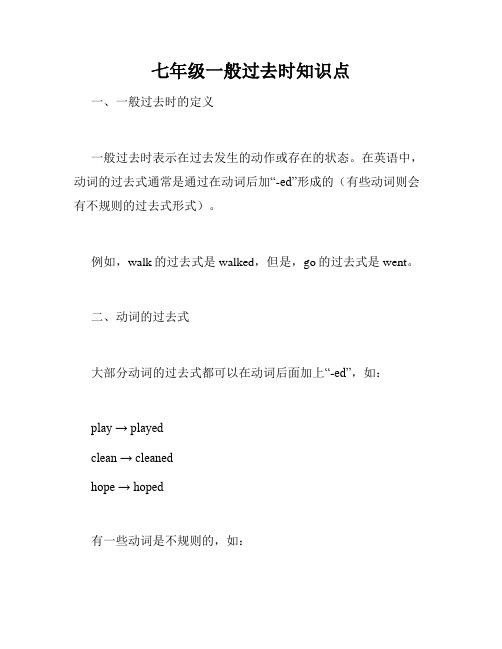
七年级一般过去时知识点一、一般过去时的定义一般过去时表示在过去发生的动作或存在的状态。
在英语中,动词的过去式通常是通过在动词后加“-ed”形成的(有些动词则会有不规则的过去式形式)。
例如,walk的过去式是walked,但是,go的过去式是went。
二、动词的过去式大部分动词的过去式都可以在动词后面加上“-ed”,如:play → playedclean → cleanedhope → hoped有一些动词是不规则的,如:go → wenthave → hadeat → ate需要记忆这些不规则形式。
三、一般过去时的肯定句、否定句、疑问句1. 肯定句构成:主语 + 动词过去式 + 其他例如:I played football yesterday.She cleaned the house last night.2. 否定句构成:主语 + did not + 原形动词 + 其他例如:I did not play football yesterday.She did not clean the house last night. 3. 疑问句构成:Did + 主语 + 原形动词 + 其他?例如:Did you play football yesterday?Did she clean the house last night?四、一般过去时的时间状语在一般过去时中,时间状语可以用来说明动作发生的具体时间。
以下是一些常用的时间状语:yesterday → 昨天last night → 昨晚last week → 上个星期last year → 去年例句:I ate breakfast yesterday.We watched a movie last night.She visited her grandparents last week.五、一般过去时的用法1. 表示过去的某个时间发生的动作。
例如:We arrived at the station at six o'clock.He went to the gym every day last week.2. 表示过去的一段时间内反复发生的动作(过去的习惯)。
初中英语知识点总结一般过去时

初中英语知识点总结一般过去时一、一般过去时的用法:一般过去时表示过去发生或完成的动作、存在的状态或做过的事情。
1.表示过去一些时间发生的动作或存在的状态:- I played soccer yesterday.(我昨天踢足球。
)- He lived in Beijing when he was young.(他年轻时住在北京。
)2.表示过去的习惯性动作或经常发生的动作:- When I was a child, I always went to bed early.(我小的时候总是早睡。
)3.表示过去的客观事实或真理:- The dinosaurs died out millions of years ago.(恐龙在几百万年前灭绝了。
)- She didn't know the answer to the question.(她不知道问题的答案。
)4.表示过去的心理活动、愿望或打算等:- I wanted to be a doctor when I was young.(我年轻时想做一名医生。
)- He hoped to go to the park with his friends.(他希望和朋友去公园。
)二、一般过去时的构成:1.肯定句式:主语+动词的过去式+其他成分- I played basketball last week.- She lived in London for three years.- They watched a movie at the cinema yesterday.2.否定句式:主语 + did not / didn't + 动词原形 + 其他成分- I didn't play basketball last week.- She didn't live in London for three years.- They didn't watch a movie at the cinema yesterday.3.疑问句式:Did + 主语 + 动词原形 + 其他成分?- Did you play basketball last week?- Did she live in London for three years?- Did they watch a movie at the cinema yesterday?三、一般过去时的特殊情况:1.动词过去式的构成规则:a) 一般情况下,动词的过去式在词尾加上-ed:walk - walked(走)talk - talked(说话)play - played(玩)b)以字母e结尾的动词,在词尾只加-d:dance - danced(跳舞)c) 以辅音字母+y结尾的动词,将y变为i,再加-ed:study - studied(学习)d) 以重读闭音节结尾,末尾只有一个辅音字母的动词,双写这个辅音字母,再加-ed:stop - stopped(停止)plan - planned(计划)2.部分动词的过去式不规则,需要记忆:be - was / were(是)have - had(有)go - went(去)do - did(做)write - wrote(写)see - saw(看见)eat - ate(吃)drink - drank(喝)take - took(拿)四、表示一般过去时的时间状语:1.表示过去一些时间的状语:yesterday(昨天)last week(上星期)two days ago(两天前)2.表示过去的时间段的状语:when I was young(我年轻时)in my childhood(在我童年时)in the past(在过去)3.表示过去曾经做过的动作的状语:once(一次)五、注意事项:1. 一般过去时的句子中,谓语动词要用过去式,但be动词有时会用was或were。
一般过去时知识点

一般过去时一、基础知识点1.定义:表示过去发生的某个动作或状态2.构成:主语+ 动词的一般过去式+ 其他3.标志词:yesterday 昨天yesterday+时间last+时间ago 之前before 在….之前the day before yesterday 前天just now 刚才4.动词的一般过去时变化规律:⑴一般情况直接在词尾加+ ed,如:cook-cooked wash-washed⑵以不发音的e 结尾的动词,在词尾+ d 如:like-liked live-lived⑶以重读闭音节结尾的动词,双写最后一个字母再在词尾+ed 如:stop-stopped shop-shopped plan-planned 计划⑷以辅音字母+y 结尾的动词,要改y 为i 再加ed 如:study-studied carry- carried 运送,搬运另外须记不规则动词的一般过去时变形。
一般过去时的做题步骤:⑴先找到句子中表示一般过去时的标志词⑵确定句子的动词是用be动词还是行为动词Be动词的过去时练习一、用be动词的适当形式填空1.I _______ at school just now.2.He ________ in Beijing on vacation last week.3.We ________ students two years ago.4.They ________ on the farm a moment ago.5.Yang Ling ________ eleven years old last year.6.There ________ an apple on the plate yesterday.7.There ________ some milk in the fridge on Sunday.二、用行为动词的适当形式填空1. He _________ (live) in Wuxi two years ago.2. The cat ________ (eat) a bird last night.3. We _______ (have) a party last Halloween.4. Nancy ________ (pick) up oranges on the farm last week.5. I ________ (make) a model ship with Mike yesterday.6. They ________ (play) chess in the classroom last PE lesson.7. My mother _______ (cook) a nice food last Spring Festival.二、基本句型转换1.一般过去时的否定句构成:有be 动词和没有be 动词两种情况⑴如果有be动词,要先找到be 动词,再在be动词后加not即主语+ be + not + 其他举例:She was very happy.分析:She 为句子主语,was 为be 动词,故She was not very happy. was not= wasn’t⑵如果没有be 动词,我们就要借用助动词didn’t, 并放在动词前面。
一般现在时、现在进行时、一般将来时、一般过去时知识点总结
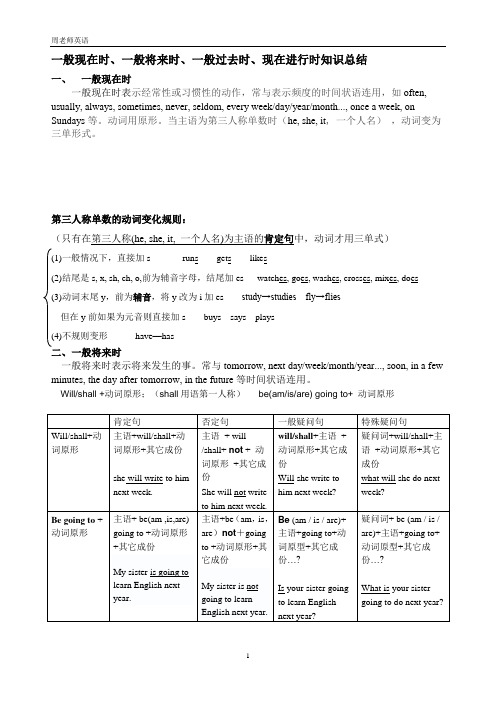
一般现在时、一般将来时、一般过去时、现在进行时知识总结一、一般现在时一般现在时表示经常性或习惯性的动作,常与表示频度的时间状语连用,如often, usually, always, sometimes, never, seldom, every week/day/year/month..., once a week, on Sundays等。
动词用原形。
当主语为第三人称单数时(he, she, it, 一个人名),动词变为三单形式。
第三人称单数的动词变化规则:(只有在第三人称(he, she, it, 一个人名)为主语的肯定句中,动词才用三单式)(1)一般情况下,直接加s runs gets likes(2)结尾是s, x, sh, ch, o,前为辅音字母,结尾加es watches, goes, washes, crosses, mixes, does(3)动词末尾y,前为辅音,将y改为i加es study→studies fly→flies但在y前如果为元音则直接加s buys says plays(4)不规则变形have—has二、一般将来时一般将来时表示将来发生的事。
常与tomorrow, next day/week/month/year..., soon, in a few minutes, the day after tomorrow, in the future等时间状语连用。
Will/shall +动词原形;(shall用语第一人称)be(am/is/are) going to+ 动词原形三、一般过去时一般过去时表示过去某一时候或某一段时间所发生了的事情或存在的状态。
常与过去时间yesterday,ago, this morning,just now,a moment ago,last night / year / week/month,once upon a time,the other day,before,the day before yesterday, in 1989, at the age of five, one day, then(那时), on that day,in the past连用。
一般过去时英语知识点
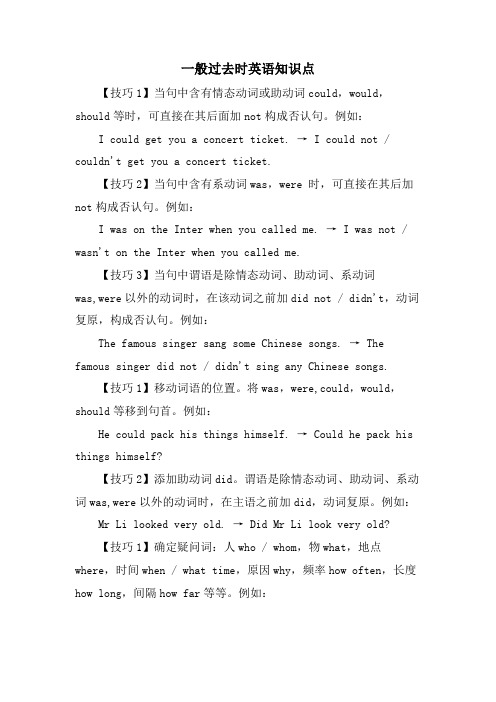
一般过去时英语知识点【技巧1】当句中含有情态动词或助动词could,would,should等时,可直接在其后面加not构成否认句。
例如:I could get you a concert ticket. → I could not / couldn't get you a concert ticket.【技巧2】当句中含有系动词was,were 时,可直接在其后加not构成否认句。
例如:I was on the Inter when you called me. → I w as not / wasn't on the Inter when you called me.【技巧3】当句中谓语是除情态动词、助动词、系动词was,were以外的动词时,在该动词之前加did not / didn't,动词复原,构成否认句。
例如:The famous singer sang some Chinese songs. → The famous singer did not / didn't sing any Chinese songs.【技巧1】移动词语的位置。
将was,were,could,would,should等移到句首。
例如:He could pack his things himself. → Could he pack his things himself?【技巧2】添加助动词did。
谓语是除情态动词、助动词、系动词was,were以外的动词时,在主语之前加did,动词复原。
例如:Mr Li looked very old. → Did Mr Li look very old?【技巧1】确定疑问词:人who / whom,物what,地点where,时间when / what time,原因why,频率how often,长度how long,间隔how far等等。
英语一般过去时语法知识点总结(完整版)这一篇就够了

英语一般过去时语法知识点总结(笔记完整版)这一篇就够了1 一般过去时的定义总结1.1 描述发生在过去时间的事情或者动作。
The meeting started at 9 o’clock. 会议在9点就开始了。
1.2 表示在过去时间所存在的状态。
I was sick last month. 我上个月生病了。
1.3 表示发生在过去,但是已经结束的事件或者动作。
We had hamburger for lunch. 我们午饭吃了汉堡。
看下面表格区分一般过去时一般现在时和一般将来时一般过去时I was two years old then. 我那时候2岁。
一般现在时I am two years old now. 我现在2岁。
一般将来时I will be two years old next Monday. 到下周一我就2岁了。
2. 一般过去时的表现/结构形式。
在汉语中表示过去只需要说时间就可以了,过去的时间就表示过去。
比如,我昨天吃汉堡了。
就表示过去但是在英语中,表示过去除了加时间(有时候也不加),还需要在动词上体现出来。
具体有2种表现形式。
一种是在Be动词上体现,一种是在实义动词(能够独立做谓语的动词)上体现。
2.1 Be动词的一般过去时Be动词的一般过去时视主语不同,有2种was/were。
主语为单数或者我时,用was。
I was two years old last year. 我去年2岁She was two years old last year. 她去年2岁主语为复数或你时用were。
We were in the library this morning。
早上我们在图书馆You were thin last year。
你去年比较苗条。
Be动词过去时的肯定及否定肯定句结构:主语+was/were +否定句结构:主语+was/were +not+否定与的缩写结构was not = wasn’t , were not = weren’t例句:翠花去年是个胖子Cuihua was fat last year.翠花去年不胖Cuihua was not(wasn’t) fat last year.Be 动词过去时的一般疑问句,与常规一般疑问句一样,把Be动词提前即可。
初中英语 一般过去时态知识点总结
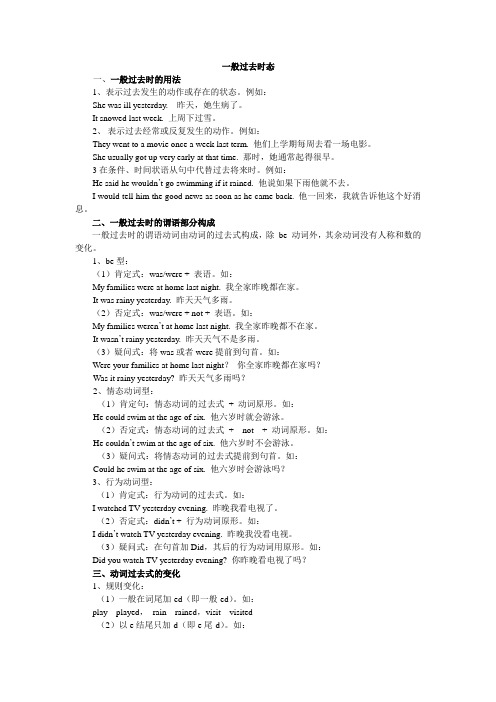
一般过去时态一、一般过去时的用法1、表示过去发生的动作或存在的状态。
例如:She was ill yesterday. 昨天,她生病了。
It snowed last week. 上周下过雪。
2、表示过去经常或反复发生的动作。
例如:They went to a movie once a week last term. 他们上学期每周去看一场电影。
She usually got up very early at that time. 那时,她通常起得很早。
3在条件、时间状语从句中代替过去将来时。
例如:He said he wouldn’t go swimming if it rained. 他说如果下雨他就不去。
I would tell him the good news as soon as he came back. 他一回来,我就告诉他这个好消息。
二、一般过去时的谓语部分构成一般过去时的谓语动词由动词的过去式构成,除be 动词外,其余动词没有人称和数的变化。
1、be型:(1)肯定式:was/were + 表语。
如:My families were at home last night. 我全家昨晚都在家。
It was rainy yesterday. 昨天天气多雨。
(2)否定式:was/were + not + 表语。
如:My families weren’t at home last night. 我全家昨晚都不在家。
It wasn’t rainy yesterday. 昨天天气不是多雨。
(3)疑问式:将was或者were提前到句首。
如:Were your families at home last night?你全家昨晚都在家吗?Was it rainy yesterday? 昨天天气多雨吗?2、情态动词型:(1)肯定句:情态动词的过去式+ 动词原形。
如:He could swim at the age of six. 他六岁时就会游泳。
一般过去时现在进行时知识点
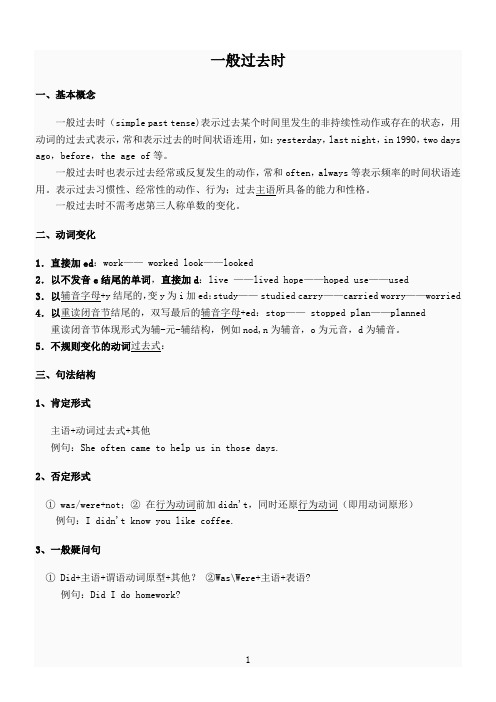
一般过去时一、基本概念一般过去时(simple past tense)表示过去某个时间里发生的非持续性动作或存在的状态,用动词的过去式表示,常和表示过去的时间状语连用,如:yesterday,last night,in 1990,two days ago,before,the age of等。
一般过去时也表示过去经常或反复发生的动作,常和often,always等表示频率的时间状语连用。
表示过去习惯性、经常性的动作、行为;过去主语所具备的能力和性格。
一般过去时不需考虑第三人称单数的变化。
二、动词变化1.直接加ed:work—— worked look——looked2.以不发音e结尾的单词,直接加d:live ——lived hope——hoped use——used3.以辅音字母+y结尾的,变y为i加ed:study——studied carry——carried worry——worried 4.以重读闭音节结尾的,双写最后的辅音字母+ed:stop—— stopped plan——planned 重读闭音节体现形式为辅-元-辅结构,例如nod,n为辅音,o为元音,d为辅音。
5.不规则变化的动词过去式:三、句法结构1、肯定形式主语+动词过去式+其他例句:She often came to help us in those days.2、否定形式① was/were+not;②在行为动词前加didn't,同时还原行为动词(即用动词原形)例句:I didn't know you like coffee.3、一般疑问句① Did+主语+谓语动词原型+其他?②Was\Were+主语+表语?例句:Did I do homework?用表格整理如下:肯定式疑问式否定式疑问否定式I worked Did I work? I did not work Did I not work?He(She,It) worked Did he(she,it)work?He (she,it)did notworkDid he(she,it)not work?We worked Did we work? We did not work Did we not work?You worked Did you work? You did not work Did you not work?They worked Did they work? They did not work Did they not work?四、口诀一般过去时并不难,过去动作、状态记心间。
初中英语一般过去时表现时态知识点
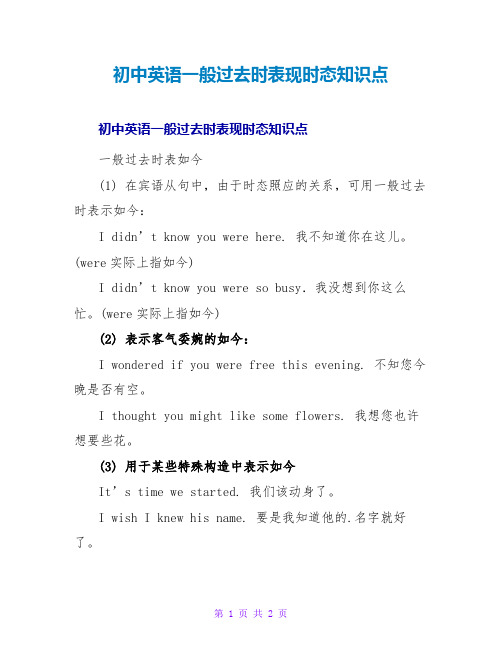
初中英语一般过去时表现时态知识点
初中英语一般过去时表现时态知识点
一般过去时表如今
(1) 在宾语从句中,由于时态照应的关系,可用一般过去时表示如今:
I didn’t know you were here. 我不知道你在这儿。
(were实际上指如今)
I didn’t know you were so busy.我没想到你这么忙。
(were实际上指如今)
(2) 表示客气委婉的如今:
I wondered if you were free this evening. 不知您今晚是否有空。
I thought you might like some flowers. 我想您也许想要些花。
(3) 用于某些特殊构造中表示如今
It’s time we started. 我们该动身了。
I wish I knew his name. 要是我知道他的.名字就好了。
I’d rather you lived closer to us. 我希望你能住得离我们近点。
【注】该用法主要用于it’s time, I wish, I’d rather, if only, as if, as though 等少数构造后接从句的情形,其中有些构造后面的句子还可用一般过去时表示将来:I’d rather you e next Monday. 我宁愿你下周星期一来。
另外表主观想法的虚拟条件句也用一般过去时表示如今:If I had the money now I’d buy a car. 假假设我如今有钱,我就买辆小汽车。
一般过去时知识点(大全)
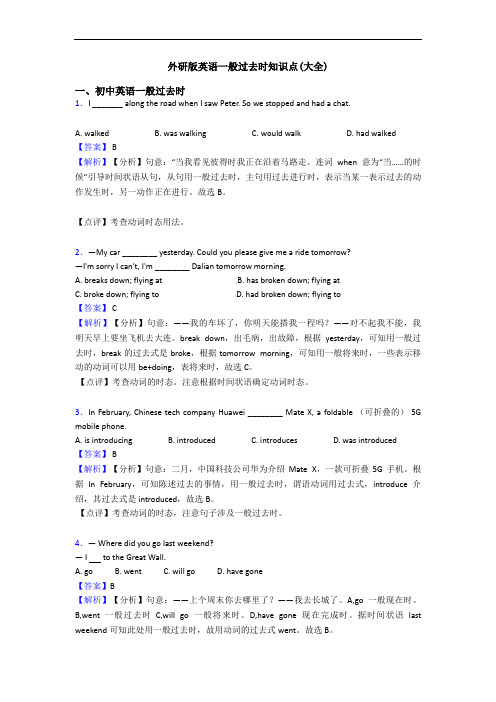
A. breaks down; flying at B. has broken down; flying at
C. broke down; flying to D. had broken down; flying to
【点评】考查语态和固定搭配,注意be seen to do的用法。
7.— Are you a basketball player in your school ?
— Yes. I ______________ the team 3 years ago. I ______________ in it for 3 years.
— Ito the Great Wall.
A. go B. went C. will go D. have gone
【答案】
【解析】【分析】句意:——上个周末你去哪里了?——我去长城了。A,go一般现在时。B,went一般过去时C,will go一般将来时。D,have gone现在完成时。据时间状语last weekend可知此处用一般过去时,故用动词的过去式went。故选B。
A. joined; was B. was joined; am C. have joined; have been D. joined; have been
【答案】D
【解析】【分析】句意:——你是你们学校的篮球运动员吗?——是的,三年前我加入了这个团队,我在里面呆了3年。3 years ago是一般过去时的标志,join和主语I之间是主动关系,且for 3 years是时间段,是现在完成时标志,故用持续性动词,have been in表示持续,故选D。
(知识点)理解一般过去时的肯定否定和疑问句

(知识点)理解一般过去时的肯定否定和疑问句理解一般过去时的肯定、否定和疑问句一、肯定句一般过去时表示过去发生的动作或状态,肯定句的结构为:“主语 + 动词过去式 + 其他”。
例如:- She studied English last night.- We went camping last summer.二、否定句在一般过去时的否定句中,使用助动词"did not"或其缩写形式"didn't"来构成。
句子结构为:“主语 + did not + 动词原形 + 其他”。
例如:- He did not watch TV yesterday.- They didn't play football last weekend.三、疑问句1. 一般疑问句构成一般过去时的疑问句需要将助动词"did"提到句子的主语之前,句子结构为:“Did + 主语 + 动词原形 + 其他?”例如:- Did she go to the party?- Did they eat dinner at home?2. 特殊疑问句特殊疑问句是以疑问词引导的疑问句,疑问词可以是who, what, where, when, why, how等。
在一般过去时的特殊疑问句中,同样需要将助动词"did"放在疑问词之前,句子结构为:“疑问词 + did + 主语 + 动词原形 + 其他?”例如:- What did you do yesterday?- Where did they go for vacation?说明:- 一般过去时的肯定句中,动词需要变为过去式,例如:study变为studied, go变为went。
- 否定句和疑问句中都使用助动词"did",而动词恢复为原形。
注意助动词"did"本身表示过去时,所以后面的动词是原形。
人教版七年级下册英语11单元知识点

人教版七年级下册英语11单元知识点语法:一般过去时(表示在过去某一时间发生的动作或存在的状态)(一)句型1、肯定句①主语+was/were+其它.②主语+动词的过去式+其它2、否定句①主语+ wasn't/weren’t+其它。
②主语+didn't+动词原形+其它。
3、一般疑问句①Was/Were+主语+其它?②Did+主语+动词原形+其它?4、特殊疑问句特殊疑问词+一般疑问句?(二) 动词过去式变化规则①一般情况在动词原形后加-ed。
②以不发音e结尾的加-d。
③以辅音加y结尾的,去y变i加-ed。
④以重读闭音节结尾,末尾只有一个辅音字母,先双写该辅音字母,再加-ed。
⑤不规则单词的过去式需要单独记忆。
重点短语:go for a walk=take a wake去散步milk a cow挤牛奶 ride a horse骑马feed chickens喂鸡talk with sb与…谈话 talk about sth.谈论某事take some photos拍照 quite a lot of相当多show …around带领,参观 learn about了解from… to… 从…到… grow strawberries种植草莓pick strawberries采草莓 go fishing去钓鱼at night在夜晚 in the countryside在乡下a lot of许多;大量 come out出来go on a school trip去学校郊游 along the way沿线after that之后 buy sth. for sb.为某人买某物all in all 总的来说 take a/the train乘火车be interested in 对…感兴趣 not…at all根本不……. How be…? …怎么样?How do/does+主语+ feel about…? 对…感觉如何?too many+可数名词复数 太多…teach sb. how to do sth.教某人怎样做某事quite a/an+形容词+可数名词单数=a very+形容词+可数名词单数 相当/非常be worried 担心。
一般过去时知识点及练习
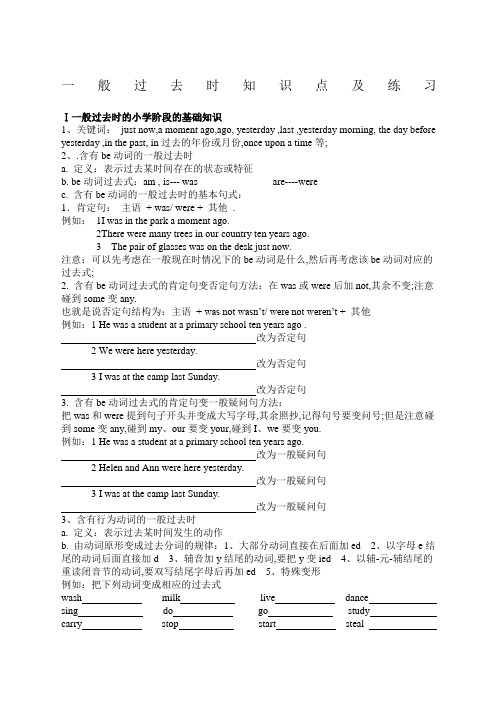
一般过去时知识点及练习Ⅰ一般过去时的小学阶段的基础知识1、关键词:just now,a moment ago,ago, yesterday ,last ,yesterday morning, the day before yesterday ,in the past, in过去的年份或月份,once upon a time等;2、.含有be动词的一般过去时a. 定义:表示过去某时间存在的状态或特征b. be动词过去式:am , is--- was are----werec. 含有be动词的一般过去时的基本句式:1.肯定句:主语+ was/ were + 其他.例如:1I was in the park a moment ago.2There were many trees in our country ten years ago.3 The pair of glasses was on the desk just now.注意:可以先考虑在一般现在时情况下的be动词是什么,然后再考虑该be动词对应的过去式;2. 含有be动词过去式的肯定句变否定句方法:在was或were后加not,其余不变;注意碰到some变any.也就是说否定句结构为:主语+ was not wasn’t/ were not weren’t + 其他例如:1 He was a student at a primary school ten years ago .改为否定句2 We were here yesterday.改为否定句3 I was at the camp last Sunday.改为否定句3. 含有be动词过去式的肯定句变一般疑问句方法:把was和were提到句子开头并变成大写字母,其余照抄,记得句号要变问号;但是注意碰到some变any,碰到my、our要变your,碰到I、we要变you.例如:1 He was a student at a primary school ten years ago.改为一般疑问句2 Helen and Ann were here yesterday.改为一般疑问句3 I was at the camp last Sunday.改为一般疑问句3、含有行为动词的一般过去时a. 定义:表示过去某时间发生的动作b. 由动词原形变成过去分词的规律:1、大部分动词直接在后面加ed 2、以字母e结尾的动词后面直接加d 3、辅音加y结尾的动词,要把y变ied 4、以辅-元-辅结尾的重读闭音节的动词,要双写结尾字母后再加ed 5、特殊变形例如:把下列动词变成相应的过去式wash milk live dancesing do go studycarry stop start stealc.含有行为动词过去式的肯定句变否定句方法:用didn’t来帮忙,后面跟动词原形;所以否定句的结构为:主语+didn’tdid not+动词原形+其他;注意碰到some变any.提示:在否定句中,不管是don’t, doesn’t或didn’t后面统统跟动词原形;例如:I did my homework yesterday evening.改为否定句My sister ate some pies just now.改为否定句We lived in Nanjing last year.改为否定句d. 含有行为动词过去式的肯定句变一般疑问句方法:用did来帮忙并放在句子开头且大写,但是过去式要恢复成动词原形,最后句号变问号;所以一般疑问句的结构为:Did+主语+动词原形+其他注意碰到some变any,碰到my、our要变your,碰到I、we要变you. 例如:I did my homework yesterday evening.改为一般疑问句My sister ate some pies just now.改为一般疑问句We lived in Nanjing last year.改为一般疑问句Ⅱ一般过去时的拓展知识初中1、特殊变形的过去式begin—began blow---blew buy---bought catch---caughtcome---came do/does---did draw---drew drink---drankdrive---drove drink---drank drive—drove eat---atefeel---felt find---found fly---flew forget---forgotget---got give---gave go—went grow---grewhave---had hear---heard hurt---hurt keep---keptknow---knew learn---learnt/learned let---let lie----laymake---made mean---meant meet---met put---putread---read ride---rode ring---rang run---ransay---said see---saw show---showed/shown sing---sangsit---sat sleep---slept speak---spoke spend---spentstand---stood steal---stole swim---swam take---tookteach---taught tell---told think---thought throw---threwunderstand---understood wear---wore win---won write---wrote2、表示过去的习惯或经常发生的动作,过去常常做某事:used to do sth例如:I used to swim in the river when I was young.课堂练习基础篇一、用所给词的适当形式填空1. Last week, my father be ill at home.2. Jim jog now. He jog every day last week.3. My mother usually do housework every day.But she do housework today.4. Last Friday, I take part in a sports meeting .5.--- he eatany ice creams last Sunday---No, he二、按要求改写句型1、Betty saw Daming in the library yesterday afternoon.改为否定句改为一般疑问句作肯定和否定回答2、I was in the library a moment ago.改为否定句改为一般疑问句作肯定和否定回答提高篇1.—Where were you last Saturday —I ____ in the Capital Museum.A. amB. will beC. wasD. have been2. Lucy ______ a student last year, but now she ______ a teacher.A. is; isB. was;isC. was;will beD. is;was3. He ______ go out with his parents, but now he ______ staying at home alone.A. used to;is used tB. is used to;used toC. use to;is used to4.—I’v just got a new MP4.—Where _____ you ____it—In a shopping mall near here.A. have; boughtB. did; buyC. are; boughtD. were; getting5. There ______ some flowers on the teacher’s des k just now, but now there______nothing on it.A. have; hasB.were; wasC. were; isD.has; has课后练习一、写出下列动词的过去式is\am_________ fly_______ plant________ are ________ drink_________play_______ go________ make ________ does_________ dance________ worry________ ask _____ taste_________ eat__________ draw________二、用所给词的适当形式填空1. They _______ glad to see each other last month.2. Today _____ the second of June. Yesterday ______ the first of June. It _____ Children's Day. All the students ______ very excited.3. I ______ watch a cartoon on Saturday.4. Her father _______ read a newspaper now. He always read one in the evening.5. We _________ to zoo yesterday, we _____ to the park. go三、句型变换1. There was a car in front of the house just now.否定句:__________________________________________________________一般疑问句:__________________________________________________________肯定回答和否定回答:___________________________________________2. They played football in the playground.否定句:__________________________________________________________一般疑问句:__________________________________________________________肯定回答和否定回答:________________________________挑战自我完成短文I _______get up at 2 a.m. and ________hear someone shouting. I _______ jump out of bed and _____ run to the kitchen. I ______ see nothing there: it was dark and quiet. I _________ run to the living room. The television ______ be still on. I ______forget to turn it off before I ________ go to bed last night.。
七年级上册英语的2e知识点

七年级上册英语的2e知识点英语学习是我们学生必修的科目,也是我们面临的挑战之一。
特别是在初中的七年级,英语课本内容愈发丰富,知识点也相应扩大了许多。
本文就为大家详细介绍七年级上册英语的2e知识点,希望帮助到各位同学。
1. 一般过去时在2e这个单元中,我们学习到了一般过去时,也就是指某个动作或事件发生在过去的某个时间。
一般过去时的构成是动词加-ed结尾。
例如:I played basketball yesterday.He watched TV yesterday.2. 时间状语时间状语是用来表示在什么时间/时间段内发生某件事情的词语,这些词语普遍出现在句子的开头或结尾,表示强调时间的先后顺序。
例如:Yesterday, I went to the park.Last week, we had a party.3. 数词数词也是2e单元中需要掌握的知识点之一。
数词是用来表示数量的词语,它可以修饰名词,也可以单独作为主语或宾语。
例如:There are three cats in the room.He has two brothers.4. 物品数量在英语课程中,需要我们学习如何描述某个物品的数量。
有两种方法来表达数量,分别是用“a”或“an”表示单数,以及用“some”表示复数。
例如:I have a book.She has an apple.There are some pencils on the table.5. 疑问句学习英语,少不了学习疑问句,也就是用来询问问题的句子。
在2e单元中,我们学习了如何构成简单疑问句,是将助动词放在句首,主语与动词调换位置。
例如:Do you like ice cream?Did you see the movie?总结:以上就是七年级上册英语的2e知识点,这些知识点是初中英语学习的基础,需要我们认真学习和记忆。
希望大家在学习英语的过程中能够扎实地掌握这些知识点,为更进一步的英语学习打下坚实的基础。
外研版英语初一年级英语英语一般过去时知识点含解析

外研版英语初一年级英语英语一般过去时知识点含解析一、初中英语一般过去时1.Yao Ming, a basketball giant, ___________ water polo when he was young.A. is playingB. used to playC. is used to playingD. was playing【答案】 B【解析】【分析】句意:姚明,一个篮球天才,当他年轻时经常玩水球运动。
根据when he was young,可知句式时态是一般过去时,used to do sth.过去经常做某事;be used to doing,习惯做某事,故选B。
【点评】此题考查一般过去时。
根据上下文的联系确定句子时态。
2.Mr Zhang and his wife _______to the party last Sunday。
()A. invitedB. was invitedC. were invited【答案】 C【解析】【分析】句意:上周星期天请的张先生和妻子参加晚会。
表示上周星期天发生的过去动作,用一般过去时态;主语Mr Zhang and his wife是谓语动词invite的承受者,用被动语态,主语Mr Zhang and his wife表示复数合义。
故选C。
3.They don't live here any longer. They _______ to Chengdu last month.A. moveB. movedC. will moveD. are moving【答案】B【解析】【分析】句意:他们不再住在这里了。
他们上个月搬到成都了。
last month是一般过去时的时间状语,动词用过去式,故答案选B。
【点评】考查一般过去时态。
4.—When _______ you _______ your homework?—I had finished it before he _______ back.A. have; finished; cameB. have; finished; was comingC. did; finish; cameD. did; finish; was coming【答案】 C【解析】【分析】考查时态。
- 1、下载文档前请自行甄别文档内容的完整性,平台不提供额外的编辑、内容补充、找答案等附加服务。
- 2、"仅部分预览"的文档,不可在线预览部分如存在完整性等问题,可反馈申请退款(可完整预览的文档不适用该条件!)。
- 3、如文档侵犯您的权益,请联系客服反馈,我们会尽快为您处理(人工客服工作时间:9:00-18:30)。
七年级一般过去时的知识点在英语学习中,时态是一个非常重要的部分,学习好时态对于提高语言能力至关重要。
而七年级一般过去时也是其中的一种重要时态。
那么,本文将为您呈现七年级一般过去时的知识点。
一、什么是一般过去时?
一般过去时是英语的一种基本时态。
它用于过去某个确定时间内发生的动作,或在过去一段时间内经常或反复发生的动作。
例如:
- He walked to school yesterday.(他昨天走路去学校。
)
- We played tennis every day last summer.(去年夏天我们每天都打网球。
)
二、一般过去时的句型结构
一般过去时的的句型结构为:
主语 + 过去式动词 + 其他
例如:
- I visited my grandparents last weekend.(我上个周末去看望了我的祖父母。
)
- She watched a movie with her friends yesterday.(她昨天和朋友一起看了一部电影。
)
三、规则动词的一般过去式
规则动词的一般过去式形式为动词的过去式(简单过去式)。
通常是在动词词尾加上了“-ed”。
例如:
- play → played
- talk → talked
- look → looked
- walk → walked
- dance → danced
但是也有一些不是在词尾加“-ed”的,称为不规则动词。
例如:
- go → went
- eat → ate
- meet → met
- see → saw
四、否定句和疑问句的构成方式
否定句:
构成方式为:主语(或代词)+ did not/didn't +动词原形+其他。
例如:
- I did not watch TV yesterday.(昨天我没有看电视。
)
- They didn't go to the party last night.(他们昨晚没有去聚会。
)
疑问句:
构成方式为:Did+主语+动词原形+其他?
例如:
- Did you eat breakfast this morning?(今天早上你吃早餐了吗?)- Did they go to the mall yesterday?(他们昨天去商场了吗?)
五、一般过去时的常见时间状语
一般过去时的常见时间状语有以下几种:
- yesterday(昨天)
- last night(昨晚)
- last week(上个星期)
- last month(上个月)
- last year(去年)
- in 1999(在1999年)
六、一般过去时的使用注意事项
- 在口语交流中,时态可以相对宽松,可以根据上下文语境来判断使用的时态。
- 一般过去时用来描述过去的事件、经验或状况,不适用于当前或未来的情况。
总之,对于英语学习者来说,掌握一般过去时的知识点是非常重要的。
透过学习过去时态,我们可以更加直观地了解过去所发生的事情,并加强对英语语言的理解和运用能力。
